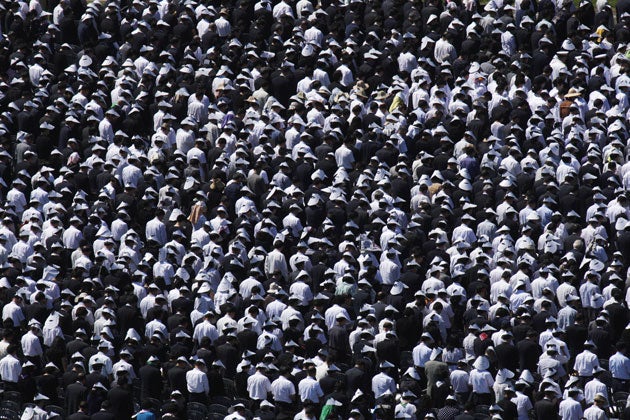Kim buried as rival Koreas meet

Your support helps us to tell the story
From reproductive rights to climate change to Big Tech, The Independent is on the ground when the story is developing. Whether it's investigating the financials of Elon Musk's pro-Trump PAC or producing our latest documentary, 'The A Word', which shines a light on the American women fighting for reproductive rights, we know how important it is to parse out the facts from the messaging.
At such a critical moment in US history, we need reporters on the ground. Your donation allows us to keep sending journalists to speak to both sides of the story.
The Independent is trusted by Americans across the entire political spectrum. And unlike many other quality news outlets, we choose not to lock Americans out of our reporting and analysis with paywalls. We believe quality journalism should be available to everyone, paid for by those who can afford it.
Your support makes all the difference.The funeral today of former South Korean President Kim Dae-jung, whose efforts to reconcile the divided peninsula won him the Nobel Peace Prize, was marked by the rival Koreas' first top level talks in nearly two years.
Kim, who died on Tuesday aged 85, was a driving force in South Korea's shift to democracy and initiated the "Sunshine Policy" to try to coax the North out of its shell, leading in 2000 to the first ever summit of the two Korean leaders.
North Korean leader Kim Jong-il sent a delegation to the South for the mourning of the former president and, with them, a message to the South's current President Lee Myung-bak whose 18 months in office have seen a sharp deterioration in relations.
The delegation, headed by a top aide to Kim Jong-il, met Lee in the latest sign the impoverished North is softening its tone after a nuclear test in May and missile launches were met with tightened UN sanctions and further international isolation.
Yonhap news agency quoted a senior presidential Blue House official as saying the meeting was a new beginning but "it's too early to expect a thaw in inter-Korean relations".
The meeting lasted about 30 minutes. The Blue House would not disclose the content of the message to Lee.
The reclusive North, furious at Lee's policy of ending aid until Pyongyang starts to dismantle its nuclear weapons programme, has all but cut ties with its far wealthier neighbour.
"President Lee said if South and North Korea solve problems through dialogue and in a sincere manner, there is nothing we cannot resolve," presidential spokesman Lee Dong-kwan said.
"(The North) expressed its gratitude for allowing the meeting and suggests both sides can cooperate and resolve (problems)."
North Korea's KCNA news agency announced the meeting with Lee but said only that the two had discussed "issues of developing relations between the north and south".
However, the KCNA report was notable for referring to President Lee without any of the derisory labels it usually attaches to his name.
The delegation was the North's first to the South in nearly two years. It flew home just before the state funeral.
Yonhap said about 20,000 mourners, the largest the country has seen for a funeral, gathered by the National Assembly to mark the death of the man who was a towering figure in the fight to bring democracy to what is now Asia's fourth largest economy.
Popularly referred to by his initials "DJ", the former president spent much of his political life behind bars or under house arrest. He was once sentenced to death and the target of a number of assassination attempts.
"My husband underwent painful suffering to keep democracy during his lifetime ... he never gave in," said his widow Lee Hee-ho, who partnered him in his fight against autocratic rule.
"I sincerely ask you to keep a spirit of reconciliation and forgiveness and to love peace and neighbours in difficulty. This is my husband's message," she told the crowd in central Seoul where the motorcade carrying Kim's coffin stopped on its way to the national cemetery.
Growing up in poverty, Kim emerged as a young leader of dissidents in parliament as military rule tightened. He finally won the presidency on his fourth attempt.
Abroad, he is best remembered for the hugs and smiles he exchanged in Pyongyang with North Korea's Kim Jong-il at the summit he brokered in 2000 - the first by leaders of the two Koreas and which led to a quick warming of ties.
Sunday's meeting is the latest in a recent series of conciliatory gestures by the North, suggesting it is ready to re-engage with the outside world.
But analysts note the North has a history of unpredictable changes of tack in its diplomacy.
Few believe it is ready to give up nuclear weapons - the one thing that gives it leverage and the threat of which has won it repeated concessions in the past.
The latest moves also coincide with reports North Korea's already ravaged economy, always on the edge of famine, may be heading into deeper difficulties from a combination of international sanctions and a poor harvest.
Join our commenting forum
Join thought-provoking conversations, follow other Independent readers and see their replies
Comments